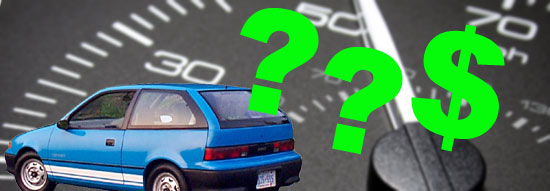Big 3 electric car questions: How fast? How far? How much?

Undoubtedly, the most frequently asked questions about this electric runabout are:
- How fast will it go?
In city driving, around 50-55 km/h (30-34 mph) - How far will it go on a charge?
Around 30-35 km (19-22 miles) in warm weather. (Keep in mind: this is on used batteries.) - How much did it cost?
Total (net) cost to date: $997.60 (Canadian)
Of course there's more to these answers. EG: what's its maximum top speed? How fast does it accelerate to 50 km/h / 30 mph? Why don't you improve it to go faster? What's the furthest it's gone on a single charge? Why don't you add more batteries to make it go further? Why don't you add a generator? How much does it cost to charge? What do you mean by "net" cost?
What's its absolute maximum top speed?
The absolute fastest the car has gone on electric power to date is 72 km/h (45 mph). This was on a very slightly downhill stretch of rural highway.
Because the car isn't very powerful, it takes a long time to get up to this speed (acceleration drops off noticeably as speed climbs). That's why I tell people that in normal city driving, 50-55 km/h is its "effective" or "practical" top speed.
It can theoretically go quite a bit faster than 72 km/h, but we would need a very loooong, flat road (Bonneville salt flats anyone?) and some patience to find out just how much faster.
How fast does it accelerate?
When the car was first built, it had a relatively low-power, 225 amp motor controller. At that time, it took 36 seconds to go from 0 to 50 km/h (30 mph). Since then, the motor controller has been upgraded twice to successively more powerful models, with the following improvements in acceleration:
0 - 50 km/h (30 mph) in ...
- 36 seconds with the original 225 amp controller
- 25 seconds with 300 amp controller
- 21 seconds with 400 amp controller
Why don't you improve it to go faster?
The car was built to be used as a runabout in a small city. The highest speed limit on any road where it's regularly driven is 50 km/h (30 mph).
What's the furthest it's gone on a single charge?
43.6 km (27 miles). Keep in mind this is on used batteries. New batteries could probably raise this to 50 or 60 km (30-37 miles).
The reason I tell people the car has a 30-35 km range is because even though it's capable of going further, it's very hard on the batteries to completely drain them by driving as far as possible on a charge. Also, the car's performance (acceleration and top speed) drops as the battery pack's state of charge falls toward "empty", so it's not practical to go as far as possible.
One other thing about range: these are figures in warm weather (spring/summer/fall). The car does not have insulated batteries, so range in winter (near- and sub-freezing) temperatures is a lot less - down as much as 30-40%. Lead acid batteries don't do well in either extreme cold or hot. Steps can be taken to solve this, but we didn't bother.
Why don't you add more batteries to make it go further?
Because 30 km is just fine for the small city where it's used. Brockville is only 10 km (6 mi.) wide. So the car's range is OK for a couple of errands per day; there's no need for more.
Why don't you add a generator to make it go further?
See above. Also, because we wanted to build an electric car.
How much does it cost to charge?
On my latest drive/charge cycle, I went 25.8 km on 4.01 kilowatt hours. Renewable electricity (hydro/wind power) costs about 9 cents per kWh. So the cost was 36 cents for the charge, or 1.4 cents per kilometer (2.3 cents/mile).
(Note this doesn't include the pro-rated cost of the batteries, which do eventually wear out. I haven't calculated this yet. Then again, we have been using second hand batteries that are cheap or free.)
What do you mean by the project's "net" cost?
The total cash outlay was closer to $2200, but we got a lot of that back by selling a bunch of stuff: $424 for left over car parts that were in good shape (engine, radiator and gas tank, etc.); we got $364 from a metal recycler for the stripped forklift; and the forklift's main drive motor was sold to another EV builder.
For all the details on the build cost, read our secrets for keeping it under $1000.